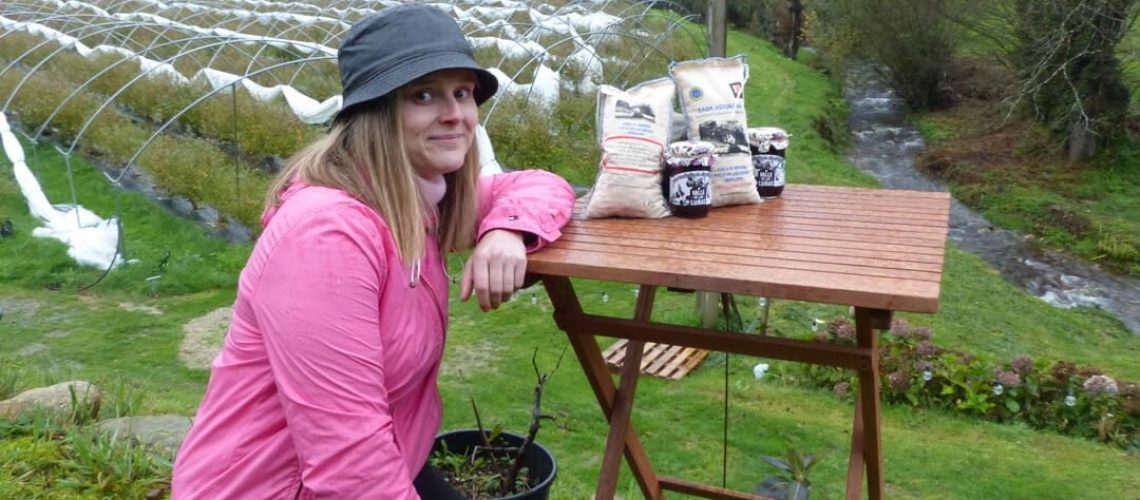Usamos cookies para asegurarnos de brindar la mejor experiencia de usuario en nuestro sitio web.
Consulta nuestros términos de uso


EL RIBEIRO FARM. SAN COSME (CUDILLERO) – 105 INHABITANTS
Isabel Rubio worked in Switzerland and Dubai earning astronomical salaries and her friends define her as “agropija”, something she laughs about. Today she applies her business experience to a model farm in the Luiñas valley.
OCTAVIO VILLA
She is a happy person. At the age of 32, Isabel Rubio is living her third life. In the first, she was a good girl from Oviedín. The best training, tennis, a life not given, but comfortable, with parents, José Carlos and Alejandra, who gave her everything. He was also a midfielder for Real Oviedo (he scored five goals in the Second Division, two against Castellón, one against Dépor, one against Elche and one against AD Ceuta) while studying chemistry and then manager of large companies in Madrid.
Isabel’s second life coincides with the moment when her parents bought, in 2007, a small house with a breadbasket and a large fertile plain next to the Panizal and Esqueiro rivers, in San Cosme, a village in the Luiñas valley, well connected, but in slight population decline. They acquire it as a weekend residence, although José Carlos soon develops a semi-hidden vocation as a farmer. He sows some faba bean plants and begins to collect citrus species, his most obvious secret passion, but, in principle, everything for home. Isabel, then in her early twenties, travels. She trained in the best centers abroad and worked in Switzerland and Dubai. From time to time, she visited her parents in San Cosme and saw how the weekend house was turning into a home, and the garden into an orchard and plantation. How José Carlos and Alejandra were daring to do more, renting farms and professionalizing the exploitation.
The Luiñas valley has everything to be an extraordinarily productive valley. It is protected from the sea and the rigors of the mountains, it has fertile and flat lands, and a permanent water supply. To the visitor, what seems impossible is not what the owners of Finca El Ribeiro are doing, but the fact that not all of the fertile plain is used for high added value crops.
And Isabel thinks so too. That is what gives rise to his third life, in which he has only been a couple of years. It is not that she is leaving everything that came before, it is that she is applying everything she has learned to optimize the farm, hand in hand with her parents. José Carlos has just retired and Alejandra is not far from it, after a life working in banking. And Isabel is doing what would seem unthinkable to many: she is focusing on her family, on the farm and on a “much happier life”.
Parents and daughter are committed to quality. Faba andecha unmodified, late blueberries (right now they manage almost 3,000 plants and their production of faba beans is beginning to be counted by tons, with a growing vocation), and they are also thinking, especially Isabel, in projects in which training is mixed with the tourism of experiences. Because they have not only made of the farm a model of exploitation to reproduce, but they have also done it with a refined aesthetic taste, faithful on the one hand to the architectural tradition of the area, but on the other hand to elegance and good living.
While they look at the plot of land they will soon replant with beans and, on the other side of the Esqueiro, the orchard of table apples of very select varieties, José Carlos and Isabel are aware that “when you do something productive, the example spreads”. Several farmers in the Luiñas have tried to produce more than just fodder on their vega farms, and some have even persisted.
Isabel is clear: “I am working on it and I will be working on it”. She has built a good life for herself, in which “it’s not so much about what you earn, but about doing things with love and with the people you love”. Father and daughter look at each other with complicity. There is a long road ahead.
FINCA EL RIBEIRO
We are a family from Oviedo that after a long and enriching search throughout the Principality, in the winter of 2007, discovered this place and made the decision to acquire the Finca El Ribeiro.
Follow us
FINCA EL RIBEIRO
Somos una familia ovetense que tras una larga y enriquecedora búsqueda a lo largo y ancho de todo el Principado, en el invierno 2007, descubre este paraje y toma la decisión de adquirir la Finca El Ribeiro.
Síguenos